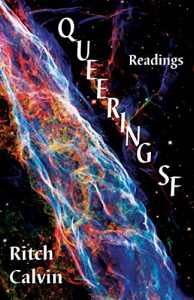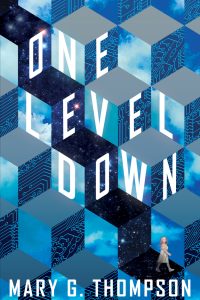Caren Gussoff Sumption Reviews Queering SF: Readings by Ritch Calvin
 Queering SF: Readings, Ritch Calvin (Aqueduct 978-1-61976-220-6, $18, 218pp, tp) May 2022.
Queering SF: Readings, Ritch Calvin (Aqueduct 978-1-61976-220-6, $18, 218pp, tp) May 2022.
Science fiction, no matter where you sit on the political spectrum, has always been the literature of possibility. Not everyone has had a voice or a seat at the proverbial table, and the genre has weathered growing pains. But at its heart, science fiction is society’s mirror, where we couch (sometimes) painful truths of where we are as humans right now by teasing out what the world can look like in the future. Sure, there are space ships, aliens, fantastic technologies – trappings which do not necessarily shape our day-to-day existence in 2022 – but science fiction is about us: how we live, how we relate to one another, and what makes humans human, by placing these concepts in conversation with the unfamiliar.
Because science fiction is, ultimately, about us, it is the natural milieu for exploring identity, gender, and sexuality, and academic Ritch Calvin’s Queering SF: Readings surveys the recent history and contemporary presence of queer voices in science fiction. Calvin uses broad strokes to define both “science fiction” and “queerness,” in his introduction, which keeps the collection of essays friendly for non-academic readers; he is clear to state that neither science fiction nor queerness is a monolith, but that both serve the same end in different ways. While science fiction as a genre invites the reader to question what they accept as real, queerness, as an identity marker, invites all of us – whether we identify personally as queer – to question what we assume about gender and sexuality.
Calvin has had to make choices. He can’t possibly cover all the historical intersections of science fiction, gender, and sexuality. Instead, he tries hard to cover one or two pieces in each essay, focused on a particular aspect of cultural gestalt. He opens the collection with a thoughtful analysis of John Varley’s 1979 story “Options”. It is hardly the earliest, or, in my opinion, best-known (or best-executed) piece that wrestles with gender identity, but Calvin uses it as an opener because of its well-meaning shortcomings. Varley plays with many cultural mores, but is not a writer known for his own personal experience of living outside gender norms (or if he has, this is not publicly known to readers or academics). In “Options”, gender is still a binary construct defined by reproductive and sexual anatomy, but the story posits a world in which the inner self and sexuality are separate from the gender binary. For readers only just learning about identity, gender, and sexuality spectra, starting the collection with this piece is a gentle warm-up to the various ways science fiction has interrogated these concepts.
From there, Calvin dives into heady territory. He takes us through how eugenics, fascism, and genocide intersect with identity and sexuality in Katherine Burdekin’s “Swastika Nights”, the politics of lesbian separatism and gender norms in Joanna Russ’s The Female Man, and Ursula K. Le Guin’s attempt at degenderization in The Left Hand of Darkness, all works well-covered in feminist theory, but not always viewed through a queer lens. Then, in no particular order, he tours through SF that has portrayed queer/QUILTBAG family and found-family structures in Octavia E. Butler’s “Bloodchild” and the Wachowski sisters’ Sense8 television series, amongst others; “disembodied” sex and identity in Caitlin Sullivan and Kate Bornstein’s “Nearly Roadkill”; drag culture in “The Moon Room” by Romasco Moore; and asexuality and self-love in Sarah Kanning’s “Sex With Ghost”. I am leaving out many, many essays and intersections; the collection includes a total of 36 pieces, and covers an impressive breadth of authors and topics.
A few things surprised me. I was personally surprised at how infrequently Samuel R. Delany was mentioned; “Aye… and Gomorrah” is examined, in terms of Harlan Ellison’s Dangerous Visions anthology series, and some of Delany’s essays and scholarship are referenced in other essays (including his work on science fiction and language in the essay on “The Moon Room”). There are other omissions that must have been hard choices to make, given space limitations, of course – Nicola Griffith does not appear in any essay, for example – and the essays are heavy on contemporary work, with only a few (mentioned) from before 2010. I don’t think it weakens the collection, necessarily, but readers looking for more historical context won’t find it here.
For the most part, Calvin’s voice is accessible, breaking down abstract concepts into palatable layperson language. Here and there, however, the voice veers into a casual tone that is… odd. It’s far from off-putting, but it does stand out, and usually it is where Calvin is trying to close an essay and lead into another topic. It’s a quirk, for sure, and may just be an unavoidable artifact left by the Herculean task of translating complex ideas in approachable ways.
Caren Gussoff Sumption is a writer, editor, Tarot reader, and reseller living outside Seattle, WA with her husband, the artist and data scientist, Chris Sumption, and their ridiculously spoiled cat-children.
Born in New York, she attended the University of Colorado, the School of the Art Institute of Chicago, Clarion West (as the Carl Brandon Society’s Octavia Butler scholar) and the Launchpad Astronomy Workshop. Caren is also a Hedgebrook alum (2010, 2016). She started writing fiction and teaching professionally in 2000, with the publication of her first novel, Homecoming.
Caren is a big, fat feminist killjoy of Jewish and Romany heritages. She loves serial commas, quadruple espressos, knitting, the new golden age of television, and over-analyzing things. Her turn offs include ear infections, black mold, and raisins in oatmeal cookies.
This review and more like it in the July 2022 issue of Locus.
 While you are here, please take a moment to support Locus with a one-time or recurring donation. We rely on reader donations to keep the magazine and site going, and would like to keep the site paywall free, but WE NEED YOUR FINANCIAL SUPPORT to continue quality coverage of the science fiction and fantasy field.
While you are here, please take a moment to support Locus with a one-time or recurring donation. We rely on reader donations to keep the magazine and site going, and would like to keep the site paywall free, but WE NEED YOUR FINANCIAL SUPPORT to continue quality coverage of the science fiction and fantasy field.
©Locus Magazine. Copyrighted material may not be republished without permission of LSFF.







